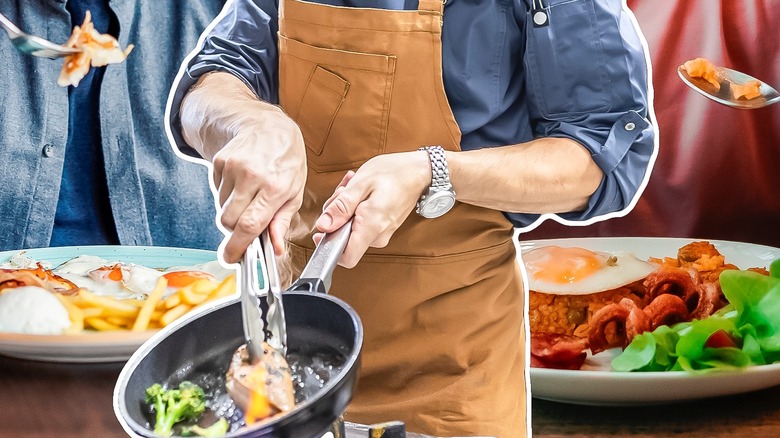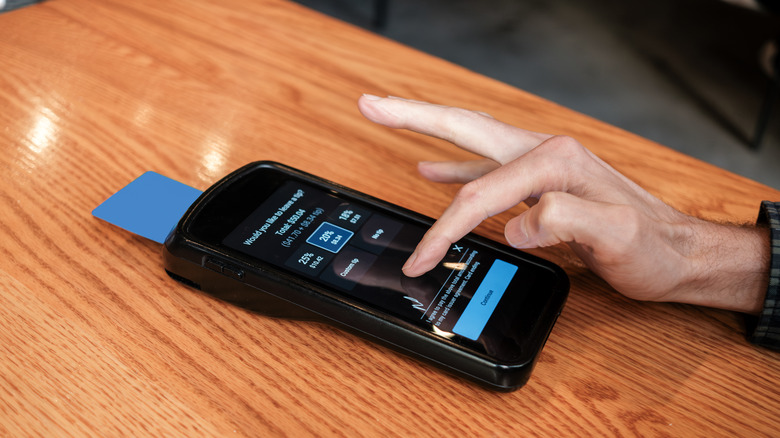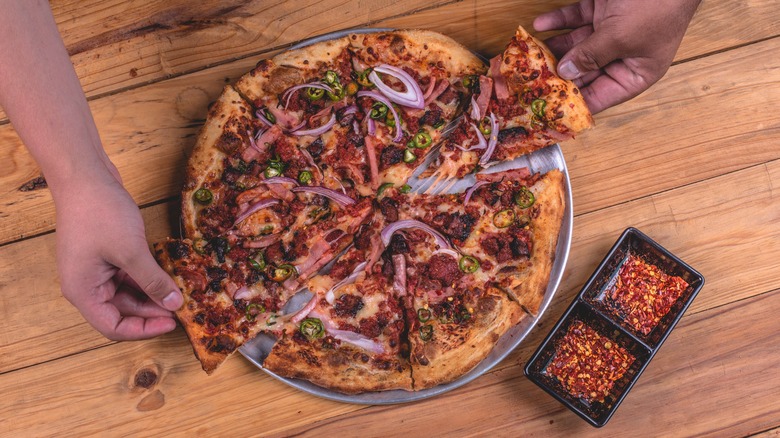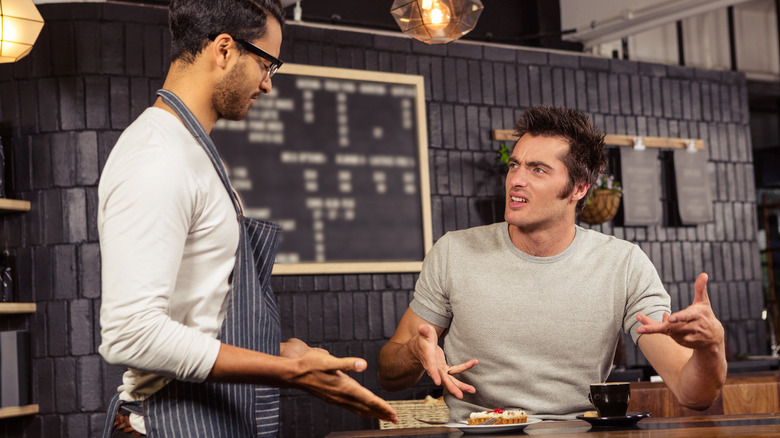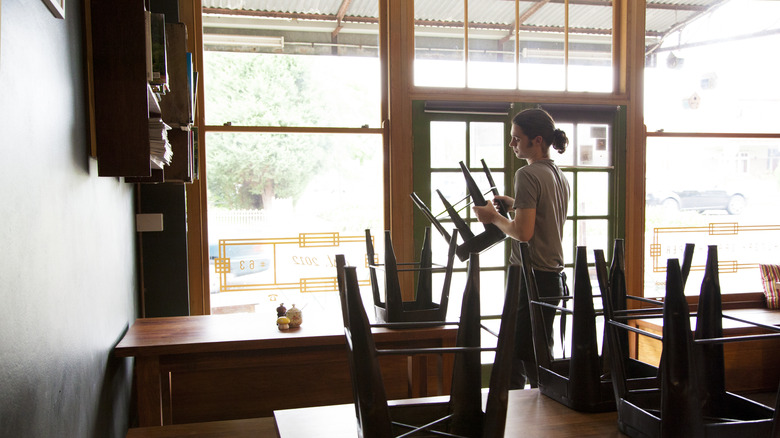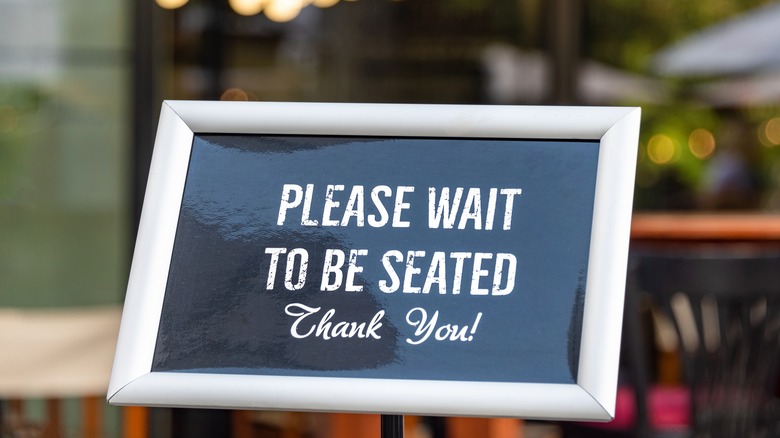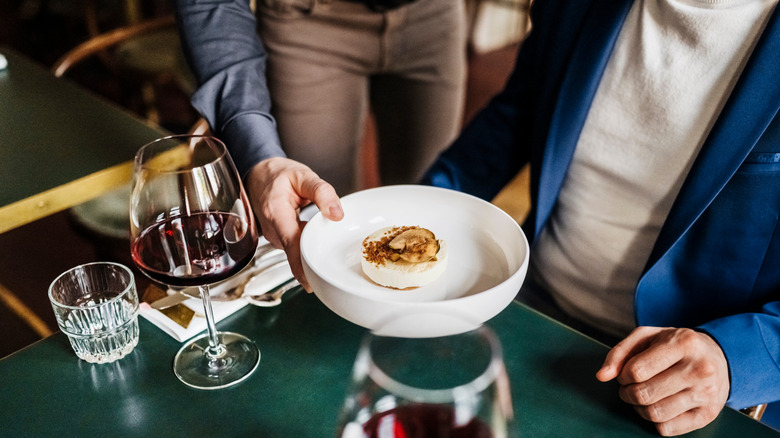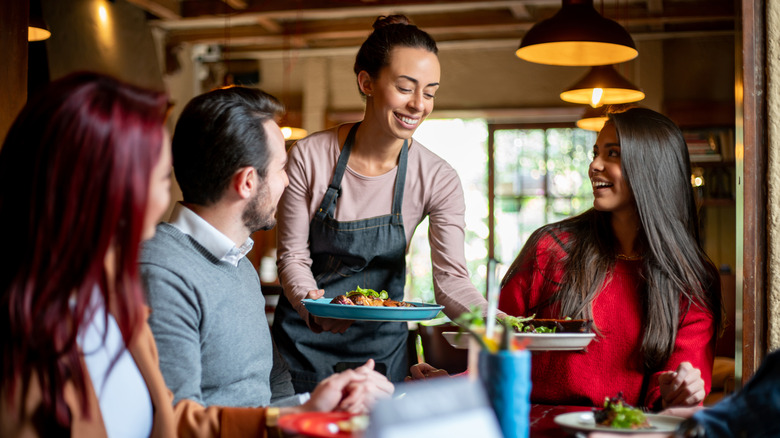How Working At A Restaurant Changes You Into A More Mindful Diner
There are some sounds that will never leave your head. It might be the crashing of waves against the shore, or music at a festival that you scored tickets to. For me, it's the printer that sat on the shelf of the pizza restaurant where I worked while in college. I remember the way it spurted and spun as pizza orders flew through the kitchen; it almost was like the metronome that set the back-of-house pace on a busy Friday.
I can still hear the buzzing and printing of the tickets, and the groans of kitchen staff — like a scene of restaurant struggles in "The Bear" — that followed. But now, with my eatery-employment days long behind me, I hear those printing orders and other familiar kitchen noises from a different perspective: as a patron. Surely, the experience of dining in an eatery and working in one is very different, but it begs the question: How does living through those experiences — of disgruntled diners, of pizzas accidentally dropped on the floor, of mid-shift breaks spent screaming within the walk-in cooler — transform someone into a different type of restaurant customer, if not a better one?
Working both back and front of house unequivocally changed the way that I experience restaurants as a patron. Now that I know (and have lived through) what happens behind those swinging doors, here are some of the ways I've found that the dining experience changes for people who have worked in a restaurant.
You won't think twice about tipping 20% or more
I grew up in a family where tipping more than 15% was frowned upon. My perspective totally changed once I started working in a restaurant and came to understand the nuances brought about by the controversial history behind tipping.
I'm not here to tell you when and where to tip, but I will tell you that the amount you're tipping probably isn't enough. In theory, how much you should tip is 20%, and the percentage should only go up from there. Once you've been neck-deep in a grease trap, dealt with customers who seemingly exist only to make your job harder, and have been covered in "trash juice" one too many times, you'll think about your selection on the tipping screen more carefully. As a diner, I will always tip at least 25% — and I'd reckon you probably won't see many industry folks ever tipping below 20%.
I tip well not only because I've lived through the experience of working at a restaurant — I've also lived through an awful tipping system. At the restaurant where I worked, I was required to take part in a tip-sharing system that meant I had to divide my tips with other employees, and also with the managers. This is just one of several such systems imposed on staff at restaurants, so although most diners won't know the tipping arrangement in place at any given establishment, it's always better to tip more than to tip less.
You'll appreciate the craft that goes into cooking
In a restaurant, you see a lot of food passing by on plates. Some of it looks very attractive (which is a big goal of the chef), but if you had the chance to try a bite of every order, you might very well find that the flavors don't always match up with the food's nice appearance. So, when you dine out at a restaurant and receive a dish that tastes absolutely divine and also makes for a good Instagram shot, take a moment to tip your hat to the kitchen crew, because that is a difficult feat to accomplish.
My restaurant experience comes from working at a pizzeria, and my pizza snobbiness has increased after trying many kitchen-test pies. When I get a chance to bite into a slice that has the perfect balance of chewiness and crispiness, it's heavenly. This is something I can truly appreciate, because I've stood in front of that roaring oven a time or two and lost enough pies to the flames to know how challenging it is to get the perfect char and texture on the crust.
I've also painstakingly arranged pepperoni on pies to ensure that the customer gets just the right amount in every bite. After that, it's now an absolutely fantastic experience to enjoy similar efforts manifested in the food on my plate — and I appreciate the work that went into getting it there.
You'll know what deserves to be sent back to the kitchen
Nobody likes messing up at work. But when you mess up while working at a restaurant, it seems like your mistakes are compounded. Not only do you have a disgruntled customer venting all of their pent-up frustration onto you because their salad came with the dressing on top rather than on the side, but you also have to ask the kitchen staff to stop what they're doing and redo an order. It's like the world needs to halt for one error that you made — and it's downright embarrassing.
That being said, restaurant staff should be attentive to your needs as a diner. But, sometimes servers get distracted by another task, and accidentally select "blue cheese" instead of "ranch" on the point-of-sale system. As a diner, I've watched customers at other tables send food back to the kitchen because of very small mistakes, or because they're trying to play the system and get a comped meal.
In my humble opinion, considering what happens when you send food back at a restaurant, doing so is a privilege that should really only be reserved for when you truly can't eat the meal in front of you. As a diner, I've sent food back only a handful of times — and if I absolutely have to do this, I'll calmly make my request and politely ask for it to be fulfilled. Restaurant staff deserve dignity and forgiveness, too.
You'll never be the restaurant's last diner ever again
Almost everyone has enjoyed at least one dinner out with friends that led to the kind of long, lingering conversations that make the evening pass by so fast. Before you realize what time it is, you start hearing the clanking of utensils being put away, the movement of chairs, the spritzing of spray bottles, and the kitchen staff chattering about closing checklists. That's your cue to ask for the bill and make your exit as quickly as possible. It's not a matter of "maybe I'll have one more drink or order a dessert to-go." It means get your stuff and get out.
After working in a restaurant, I've developed a phobia of becoming that last patron of the night. I even plan my restaurant visits based on the amount of time that I think I'll be spending there, just to ensure that my visit doesn't prevent the staff from having an adequate amount of time to clean up before going home at a reasonable hour.
Working in food service is a grueling job, and nobody needs their workdays to be made longer by customers who selectively choose not to notice the "closed" sign on the door, or don't bother to check the restaurant's hours on Google before heading there. It's merely a matter of reading the dining area and observing when it may be too late to be asking for a table — visit another time, and show up earlier.
You'll be less bothered by wait times
As a kid, having to endure a 20-minute wait for a table at a restaurant can be tantrum-inducing. A similar reaction can also be seen among many grown-up restaurant patrons who expect to be seated immediately in the middle of a weekend rush, after they're told that there is a substantial wait time.
For a restaurant's front-end staff member, calculating a wait time for customers is subjective. If anything, the host is going to add about 10 minutes to the time actually estimated, just to ensure that diners don't become combative when the estimated time passes and a table still isn't cleared. So, in all honesty, it's likely that your wait time isn't as bad as it seems — and it's not your host's fault that you didn't plan ahead to avoid waiting. Rest assured that your host wants those tables cleared just as much as you do.
With that in mind, if I choose to eat at a restaurant without planning ahead, I'll accept the wait time that's given to me. If I don't want to wait, I will make restaurant reservations or call ahead — or just simply show up earlier. If I'd never experienced sweat dripping down my back while being stared down by a scowling guest after telling them that they'd have to wait an hour for a table, I probably wouldn't be as cool about standing around for a few minutes when waiting for a table myself.
You'll try to be a helpful diner
Dining out is undoubtedly a cool experience. You get to sit back, have other people do the cooking and cleaning, and really enjoy the food that's in front of you. But your restaurant visit is certainly not an excuse to be a slob. If you drop a fork under the table while you're eating, it's usually much less difficult for you to lean down and pick it up than it is for a server to search for it later. Or if you spill something on the seat, just tell a staff member so that it can be taken care of, rather than hiding the mess to be discovered by the next customers at that table.
As someone who has cleaned tables with record speed during a busy shift, I am considerate about organizing the post-meal mess so that it's easy to clear. As a diner, I find myself subconsciously assisting the staff by consolidating leftover food on one plate and collecting the silverware for easy access. Even 30 seconds of my efforts makes the job easier for the restaurant employees taking care of you for the evening — and that's 30 seconds that make a world of difference.
One of the most unexpected ways to help out your busser? Finish your drink. Yes, the drink that you probably paid for. The employee in charge of emptying those cans and bottles, which reek of every fermenting agent known to humanity, will thank you.
You'll reminisce about the good, the bad, and the ugly
I will never say that working in a restaurant is easy. The stressful, searing hours of fast-paced shifts (not to mention enduring the never-ending time warp that is a slow shift) can be both mentally taxing and physically taxing. As a diner, you won't have to experience those trials and tribulations, but you do get to reap the benefit of that work, in the form of tasty food and good company.
Anyone who has worked at a restaurant will know what I've been describing. You'll find yourself in the weird in-between state of still feeling like you could walk into the kitchen, throw on an apron, and get to work — but you'll also want to sit back and sip on your cocktail of choice without bringing back a suppressed memory. Well, even if you never experienced food-service employment, take a short while to reflect on what it's like to be in the shoes of those restaurant workers, both in the front and back of house.
If anything, you can take a second to appreciate the craft, the strain, and the effort that goes into this tough, tough industry. Is it always enjoyable? Certainly not. But it's certainly transformative, both in shaping you as a person and as a patron.
